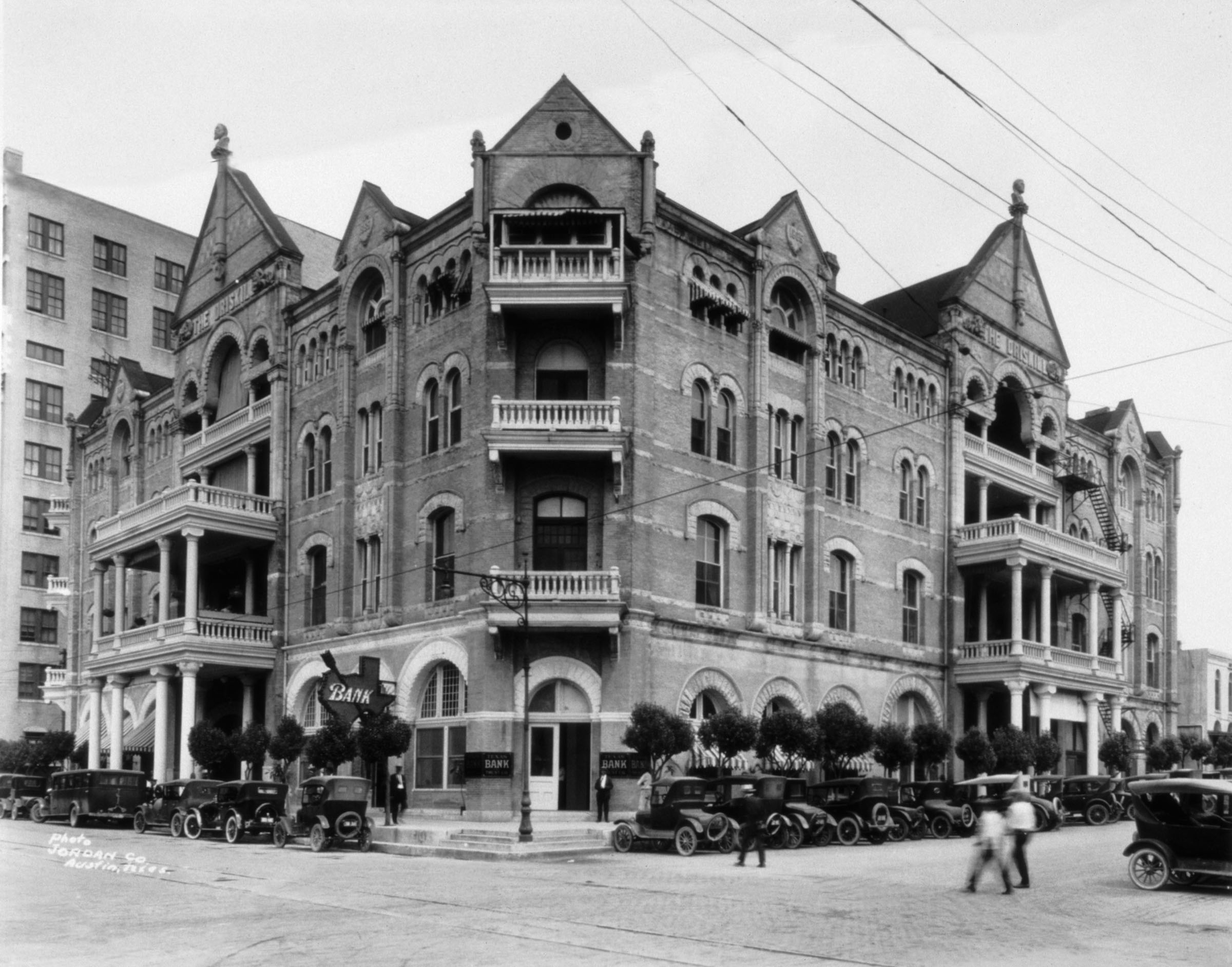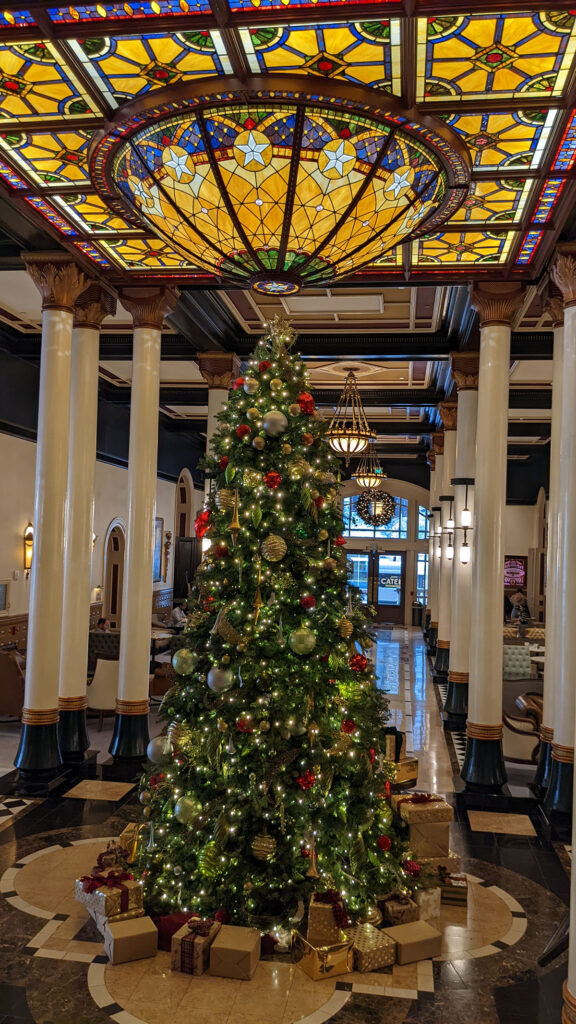
The Driskill Hotel sits on the corner of Sixth and Brazos streets. Photo courtesy of the Driskill Hotel.
At one point in 2007, I found myself between jobs and needing to come up with my half of the rent for the apartment I shared with my then-boyfriend, now husband. During a downtown Austin stroll, the Romanesque structure of the Driskill Hotel stood out among the parking garages and shot bars lining Sixth Street. I popped into the 1886 Cafe & Bakery and asked for a job application, even though I hadn’t waited tables in eight years.
The high arched, dark wood-framed windows lining the cafe’s walls and the tiny mosaic tiles under my feet reminded me of cafes I had visited in other historic city centers. If I was going to wait tables again, this setting wasn’t too shabby for my own personal service industry reboot. I got the job and stayed a year, witnessing everything from Christmas celebrations to a marriage proposal to the international South by Southwest crowds.
This month marks the Driskill Hotel’s 135th anniversary. Since its opening on Dec. 20, 1886, the hotel has become a sort of Forrest Gump of Austin institutions: Like the fictional character’s story occurred alongside so many key historical moments, the Driskill has been the site of history that has rippled beyond the state’s borders.
Wealthy cattle baron Col. Jesse Driskill built the hotel with the goal that it be the “finest hotel south of St. Louis.” Today, the grandiosity of the hotel’s exterior structure remains stunning on its corner in downtown Austin. The interior spaces, dappled with cowhide rugs, Western art, saddle-hued leather, and brown and cream Western-themed toile wallpaper, seem designed specifically for the pleasure of a fancy trail boss or frontier lady.
Originally, the Driskill had 60 guest rooms with suites that had private baths, a lodging anomaly at the time. The hotel now has 189 guest rooms and suites, many of which were added with the hotel’s annex in 1930 and some of which are rumored to be haunted.
Much of the hotel’s history has occurred in its public spaces. In October 1931, jazz icon Louis Armstrong had a three-day residency there. Admission to one of his shows: 75 cents. Among those in attendance on opening night was a University of Texas freshman named Charlie Black, who had never heard of Armstrong and wasn’t familiar with his musical genre. He went hoping to dance with girls. But Black would later tell the Washington Post that attending Armstrong’s show at the Driskill was a pivotal moment for him.
“We literally never saw a black man, then, in any but a servant’s capacity,” he said. “Louis opened my eyes wide, and put to me a choice. Blacks, the saying went, were ‘all right in their place.’ What was the ‘place’ of such a man—and of the people from which he sprung?”
Black became a distinguished teacher of constitutional law at Yale Law School and volunteered for the team of lawyers who persuaded the Supreme Court in Brown vs. the Board of Education in 1954 that segregating schoolchildren along color lines was unconstitutional. To think a jazz concert at the Driskill in 1931 played a role in forcing the nation to confronting shift its segregationist culture.
The Driskill served as Lyndon B. Johnson’s unofficial headquarters during his legislative and presidential career. It also struck a chord in his heart, as he and Lady Bird had their first date there, a breakfast in 1934. Later during LBJ’s 1948 Senate run and his 1964 presidential campaign, the Johnson family decamped to the Jim Hogg Parlor, named for the 20th governor of Texas, to await campaign results.
On the hotel’s second floor, just outside its famed circular bar, a glass display case houses artifacts commemorating the Johnsons’ love for the Driskill. There’s a small bust of LBJ and a photo of Lady Bird with a handwritten note from the first lady thanking Driskill staff. Another photo shows LBJ and family watching election returns on a small television in the Jim Hogg Parlor in 1964.
Businesses ranging from barber shops to broadcasting stations set up shop at the Driskill over the years. KTBC-TV, now Austin’s Fox 7 station, aired its first television broadcast from the Driskill’s Victoria Room on Nov. 27, 1952. The hotel was also home to Austin’s first radio station, KTBC radio, now Austin’s KLBJ. Lady Bird bought the radio station with inheritance from her family and remained involved in station operations through her 80s.

The hotel lobby today, decorated for Christmas. Photo by Jen Hamilton Hernandez.
From radio to television, the Driskill then evolved into a nexus of the music and film industries during the month of March, when thousands flock to Austin for the South by Southwest festival. Accompanied by a cellist, actor Bill Murray gave a dramatic reading of Lawrence Ferlinghetti’s poem “Dog” on the front steps of the Driskill to promote his film Isle of Dogs at the 2019 festival. Lena Dunham celebrated at the Driskill when her film Tiny Furniture won the juried narrative film prize at the festival in 2010. That win launched her career as an acclaimed filmmaker and voice for the millennial generation.
In a short story called “A Room in the Driskill,” published by the literary journal The Kenyon Review in 1986, Texas writer Ewing Campbell romanticizes the hotel as a sort of parlor for writers. Campbell’s narrator writes to a friend: “The hotel, as you may know, is old and numinous, tastefully restored, in the last 10 years or so to its original elegance. Everything about it speaks of another age; so you can easily imagine the old world atmosphere present when a few of us—Ortega, Bonazzi, Christensen—met there with Borges in the spring of 1981.”
Speaking of restorations, this year 14 suites were renovated, including the 805-square-foot LBJ Suite, which boasts a balcony overlooking Sixth Street. The Hyatt, which currently owns the hotel, had plans to spruce up the other 175 rooms over the next couple of years, adding bright white colors, removing the crown moldings, and giving the rooms “a light and airy feel, a look for the modern traveler rather than a ranch look…[but there] will still be plenty of Texas touches throughout,” says Alessandra Lenardon, the Driskill’s marketing manager. However, she says the project has been put on hold due to “a potential change in ownership.”
For now, in the winter of 2021, the Driskill’s arched doors are open to visitors, welcomed by the lobby Christmas tree standing tall and pristine. That old world atmosphere Campbell described is poised to be the backdrop for many more stories in the years to come.








